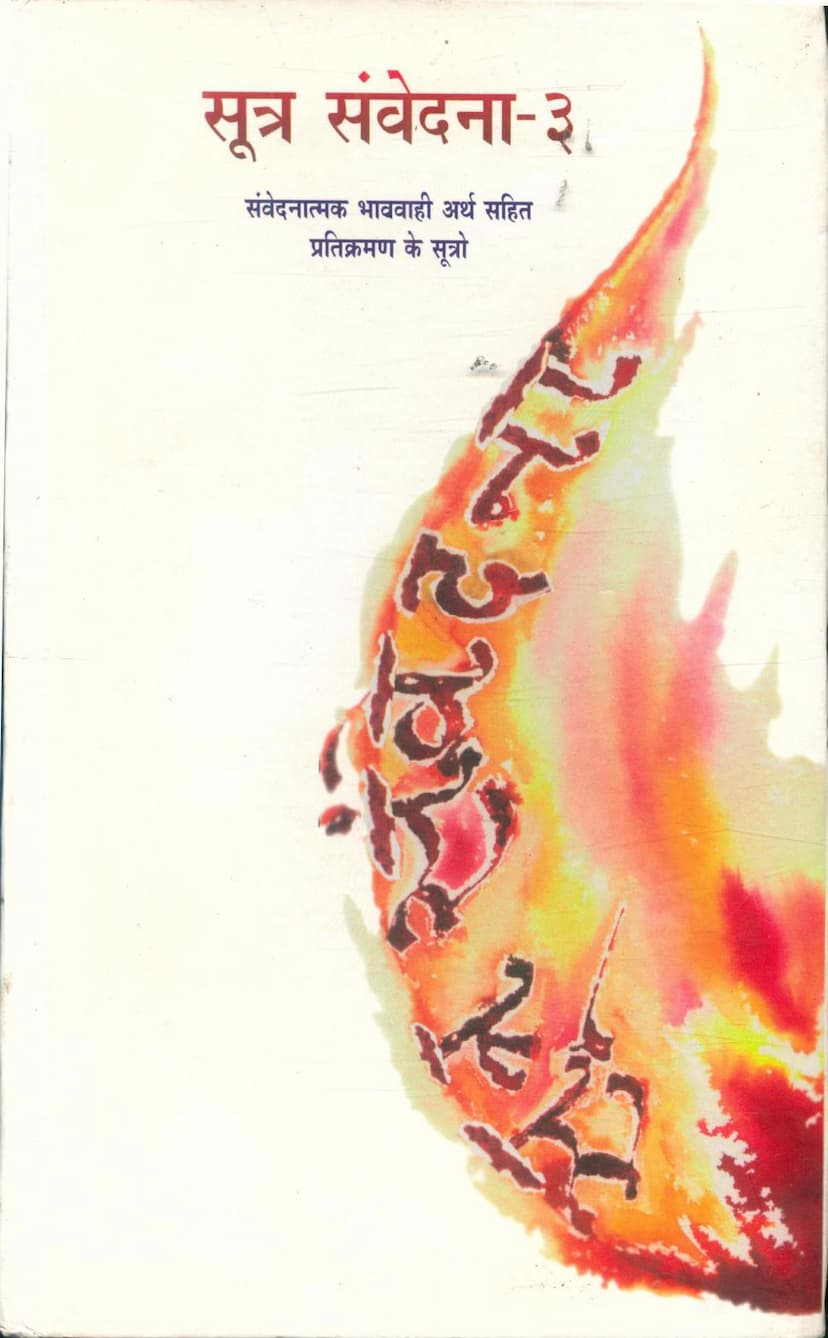Sutra Samvedana Part 03
Added to library: September 2, 2025

Summary
Here's a comprehensive summary of "Sutra Samvedana Part 03" by Prashamitashreeji:
Book Title: Sutra Samvedana Part 03 (सूत्र संवेदना - ३) Author: Sadhvi Shri Prashamitashreeji Publisher: Sanmarg Prakashan Catalog Link: https://jainqq.org/explore/006126/1
Overall Purpose: "Sutra Samvedana Part 03" is the third installment in a series dedicated to explaining Jain scriptural texts, specifically focusing on the principles and practices of Pratikraman (repentance and confession). The series aims to provide a deeper, more emotionally resonant understanding of these essential Jain rituals by elucidating their underlying meanings and encouraging a bhavanushthan (experiential practice) rather than mere ritualistic performance. This particular volume delves into specific Pratikraman sutras (aphorisms or verses).
Key Themes and Content:
-
The Essence of Pratikraman: The book emphasizes that Pratikraman is a vital Jain practice for purifying the soul, which has been obscured by karmas accumulated through beginningless time. It's presented as a path to regaining the soul's inherent nature of infinite knowledge and bliss. The text highlights that while practices like Samayika and Prabhu Vandana (observed in earlier volumes) are important, Pratikraman provides the crucial self-observation and introspection needed to identify and rectify one's faults.
-
Focus on Pratikraman Sutras: This volume is dedicated to explaining the sutras that are fundamental to the Pratikraman ritual. It covers seven specific sutras that precede the more detailed "Vanditu" sutra (which was elaborated upon in Part 04). These sutras, though short, are considered profound in their meaning and help the practitioner deeply examine even the smallest faults.
-
Sutra-by-Sutra Explanation: The book meticulously explains each of the seven sutras, providing:
- Introduction (Sutra Parichay): Explaining the context and purpose of the sutra within the Pratikraman ritual.
- Original Sutra: Presenting the sutra in its original language (likely Apabhramsha or Prakrit, as indicated).
- Sanskrit Translation and Meaning: Providing a Sanskrit rendering for clarity and then breaking down the word-by-word meaning.
- Detailed Exposition (Vishesharth): Offering an in-depth explanation of the concepts, sentiments, and implications embedded in each word and phrase of the sutra. This includes the philosophical underpinnings and practical applications of the teachings.
-
Specific Sutras Covered (as per the Index):
- Bhagavanham Sutra: This sutra focuses on venerating the divine and the spiritual guides (Gurus – Bhagavan, Acharya, Upadhyay, Sarva Sadhu). It explains the respectful bowing and the underlying gratitude and reverence towards these spiritual authorities.
- Padikkaman Thavana Sutra: This is the "Pratikraman Establishment Sutra," which marks the beginning of the Pratikraman process. It involves seeking permission from the Guru to commence the ritual.
- Ichhami Thami Sutra: This is a crucial sutra for confessing and repenting for aticharas (transgressions or faults) committed in mind, speech, and body during the day. It covers the essence of regret and the desire for purification, addressing violations related to knowledge (Jnana), perception (Darshana), conduct (Charitra), and the specific vows taken by lay followers.
- Nanammi Dansanmi Sutra: This extensive sutra delves into the five Acharas (conducts): Jnana Achara (conduct related to knowledge), Darshana Achara (conduct related to right perception), Charitra Achara (conduct related to right conduct), Tapa Achara (conduct related to penance), and Virya Achara (conduct related to spiritual energy/effort). Each Achara is further elaborated with its constituent parts and the faults (aticharas) associated with not practicing them correctly.
- Suguru Vandana Sutra: This sutra is dedicated to the proper way of venerating one's Guru. It outlines a six-step process involving expressing the desire to bow, seeking permission, purifying one's body and mind, inquiring about the Guru's well-being and spiritual progress, and finally confessing and repenting for any unintentional offenses committed against the Guru.
- Seven Lakh Sutra: This sutra focuses on seeking forgiveness from all living beings across the 8.4 million life forms (Jiva Yonis) that one might have harmed or caused suffering to through mind, speech, or action. It emphasizes the concept of Ahimsa (non-violence) and the karmic consequences of harming others.
- Adaraha Papsthanak Sutra: This final sutra in the volume details the eighteen primary categories of sins (Papsthanak) that lead to karmic bondage. It begins with Prana-tipata (violence) and progresses through falsehood, theft, lust, greed, anger, pride, deceit, greed, attachment, aversion, conflict, false accusation, slander, dislike, backbiting, false speech mixed with deceit, and culminates in Mithyatva Shalya (the piercing delusion of false belief). The purpose is to make the practitioner aware of these pitfalls and encourage repentance.
-
Bhavanushthan (Experiential Practice): A significant emphasis is placed on moving beyond mere intellectual understanding. The text repeatedly urges readers to connect with the emotional core of the sutras, to feel the sentiments of regret, gratitude, and devotion, and to allow these feelings to transform their actions and inner state. The goal is to make Pratikraman a deeply internalized and transformative experience.
-
Guidance for Sadhana: The book serves as a guide for spiritual seekers, particularly monks and nuns, as well as devout lay followers (Shravaks and Shravikas), in understanding and performing Pratikraman with the correct intention and emotional engagement. It aims to equip them with the scriptural knowledge to enhance their spiritual practice.
-
Legacy of Wisdom: The author acknowledges the blessings of her Gurus and previous scholars, highlighting the importance of the lineage of knowledge transmission in Jainism. The book is a testament to the effort of making profound spiritual teachings accessible to a wider audience.
In essence, "Sutra Samvedana Part 03" is a profound and practical guide to understanding and experiencing the core principles of Jain Pratikraman. It seeks to bridge the gap between scriptural knowledge and genuine spiritual transformation by illuminating the emotional and philosophical depth of these sacred verses, empowering readers to purify their souls and progress on the path to liberation.